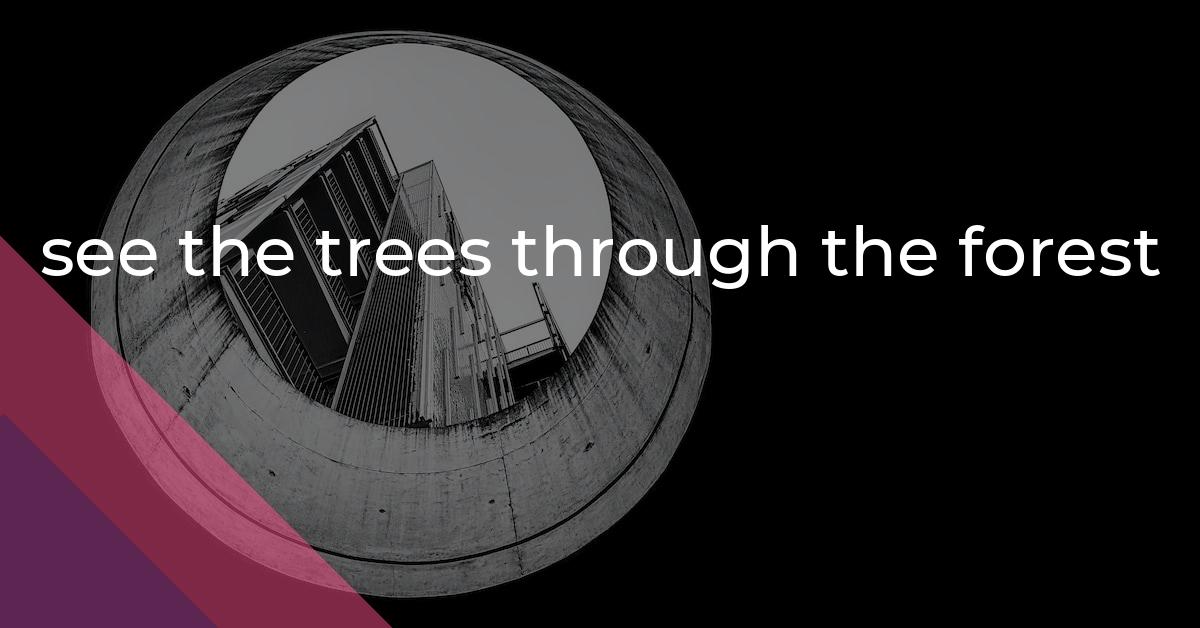see the trees through the forest: Idiom Meaning and Origin
What does ‘see the trees through the forest’ mean?
The idiom "see the trees through the forest" means to focus on small details and lose sight of the overall picture or main idea. This can happen when someone becomes too absorbed in the minor aspects of a situation and fails to understand the larger context or objective.

Idiom Explorer
"See through" means to recognize the true nature or hidden agenda of something or someone, often referring to a person's dishonesty or deceitful behavior.
The idiom "see things" means to perceive or experience something in a particular way, often different from reality. It implies a subjective understanding or interpretation of a situation or event.
The idiom "see the light of day" means to be revealed or brought to attention after being hidden or kept secret for a period of time.
The idiom "see the light" means to finally understand or realize something, often after a period of confusion or ignorance.
The idiom "see the forest for the trees" means to be unable to see the overall picture or the big picture because you are too focused on the details or individual parts of a situation.
The idiom "see the elephant" means to experience something thrilling or unexpected, often with negative consequences or hardships.
The idiom "see into a millstone" means to have great insight or perception, being able to understand even the smallest details or hidden motives in a situation or person.
The idiom "seeing is believing" means that someone is more likely to believe something when they see it with their own eyes, rather than simply hearing about it or being told about it by someone else.
Whispering secrets within woodland
The idiom *see the trees through the forest* is used to describe the act of focusing too much on minor details and missing the big picture or overarching concept. It implies a lack of perspective and the inability to grasp the broader context due to excessive attention to small elements. The idiom suggests a narrow viewpoint that hinders understanding and prevents the ability to see the whole forest because one is preoccupied with observing individual trees.
While the exact origin of this idiom remains unknown, its figurative use can be traced back to at least the 19th century. It is possible that this expression draws on the inherent nature of forests, where trees appear clustered together and can obscure the view of the entire forest if observed individually. Alternatively, the phrase may have evolved from the similar idiom "*see the forest for the trees*," which conveys a similar meaning but is less commonly used.
This idiom is often employed in situations where individuals become overly focused on specific details or minor aspects of a problem, idea, or situation. It warns against getting lost in the minutiae and emphasizes the need for a broader perspective. By suggesting that one should "see the trees through the forest," the idiom emphasizes the importance of stepping back to gain a larger understanding and avoid being overwhelmed by the multitude of smaller elements.
When used in conversation or writing, the idiom serves to remind individuals to consider the bigger picture and not become fixated on individual components that may be inconsequential or distract from the main point. It highlights the need for balance between attention to detail and a comprehensive view. By employing this phrase, speakers can convey their belief in the significance of understanding the overall context and ensuring that the details align with the broader objective.
Another related idiom is "see the forest for the trees." This idiom means the opposite of "see the trees through the forest." It suggests that someone is unable to see the details and focuses solely on the big picture. They might miss important nuances or fail to understand the intricacies of a situation due to their broad perspective. It indicates a tendency to overlook or neglect the smaller elements within a larger framework.
A similar idiom is "miss the forest for the trees." This expression conveys a similar meaning to "see the forest for the trees" and implies that someone is so consumed with analyzing individual trees that they fail to recognize the forest as a whole. They become fixated on specific details and lose sight of the broader context or objective. By focusing excessively on the trees, they miss out on the significance of the overall forest.
Similarly, the idiom "miss the woods for the trees" shares a comparable meaning to "miss the forest for the trees." It suggests that someone is too engrossed in examining individual trees and overlooks the entirety of the woods. This idiom emphasizes the importance of zooming out and considering the greater landscape instead of being solely focused on individual components. By failing to see the woods, one fails to understand the complete picture within which the trees exist.
Lastly, the expression "miss the wood for the trees" is another variant of this idiom. It conveys a similar idea of becoming overly focused on details and missing the broader context. By fixating on individual trees, one fails to recognize the wood, or the entire forest. It highlights the problem of losing sight of the bigger picture due to excessive attention to minor elements.
These related idioms all speak to the challenge of finding the right balance between focusing on details and understanding the larger context. They warn against becoming too absorbed in minor elements and remind individuals to step back and consider the overall picture. The idiom "*see the trees through the forest*" invites us to remember the importance of perspective and to avoid getting lost in the minutiae, allowing us to appreciate the forest as a whole while acknowledging the significance of each individual tree.
Example usage
Examples of how the idiom "see the trees through the forest" can be used in a sentence:
- She had trouble seeing the trees through the forest, as she was overwhelmed by the countless details and couldn't focus on the bigger picture.
- They were so focused on individual tasks that they failed to see the trees through the forest, leading to a lack of coordination and inefficiency.
- Instead of getting caught up in every small issue, it is important to step back and see the trees through the forest to prioritize what truly matters.
More "Perspective" idioms



